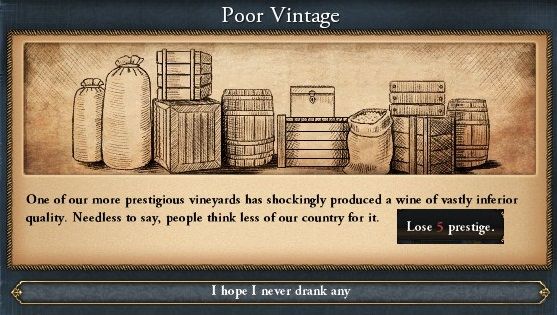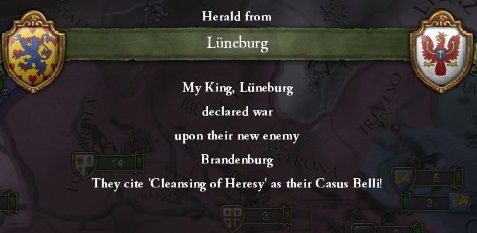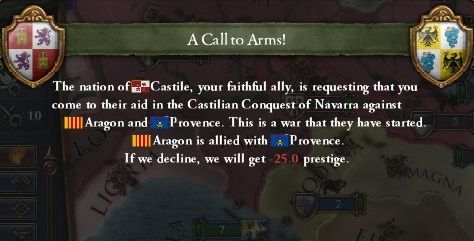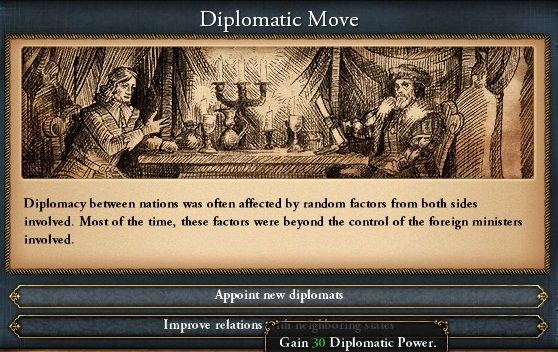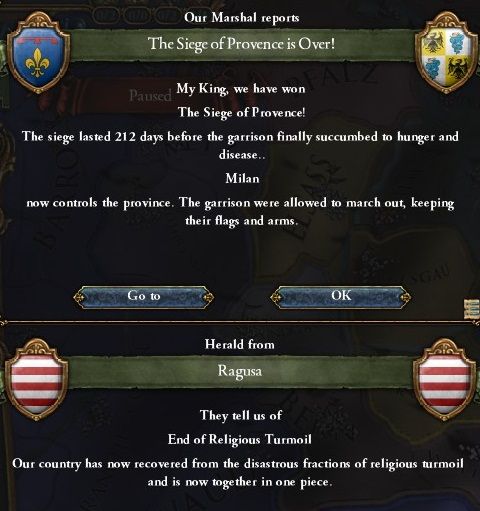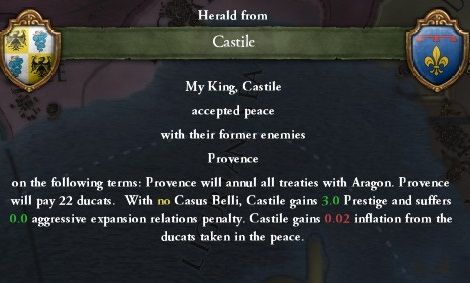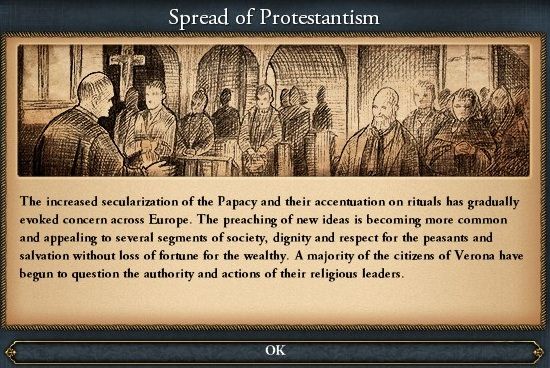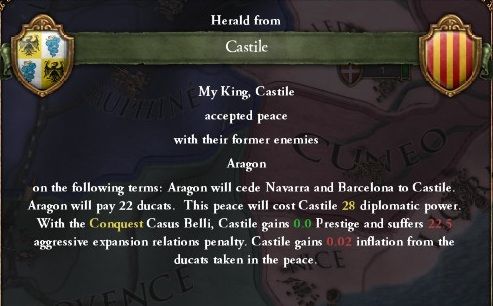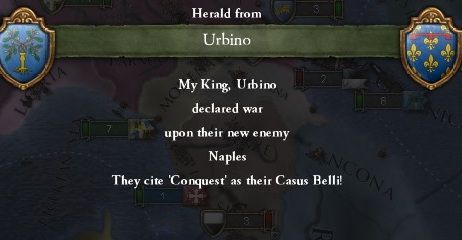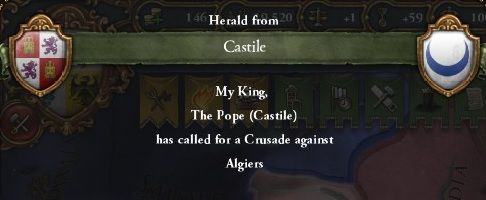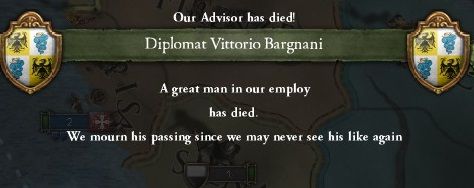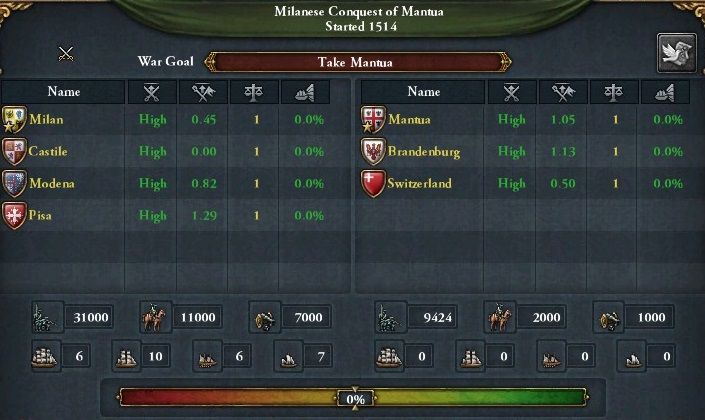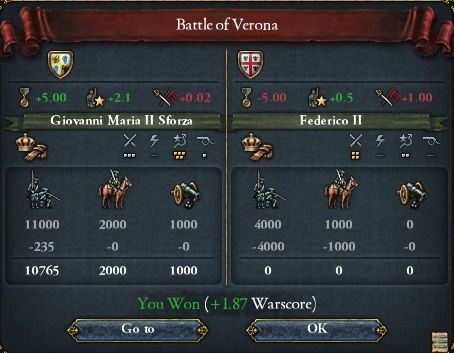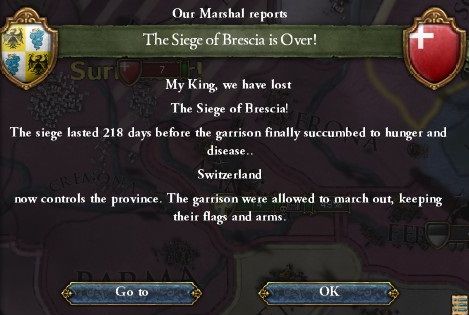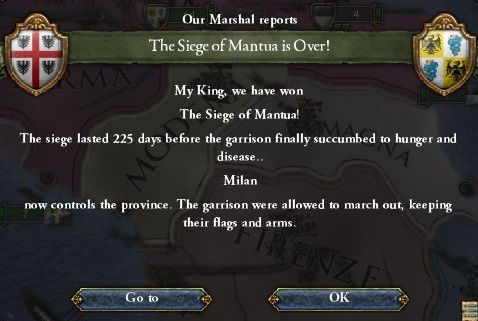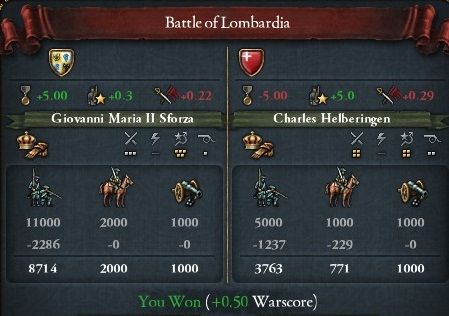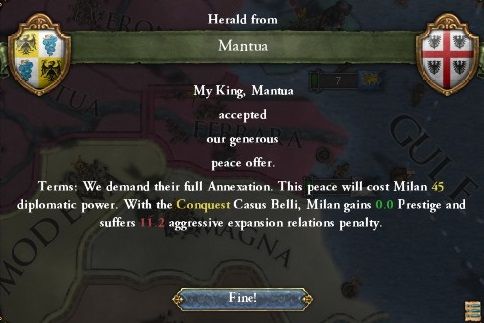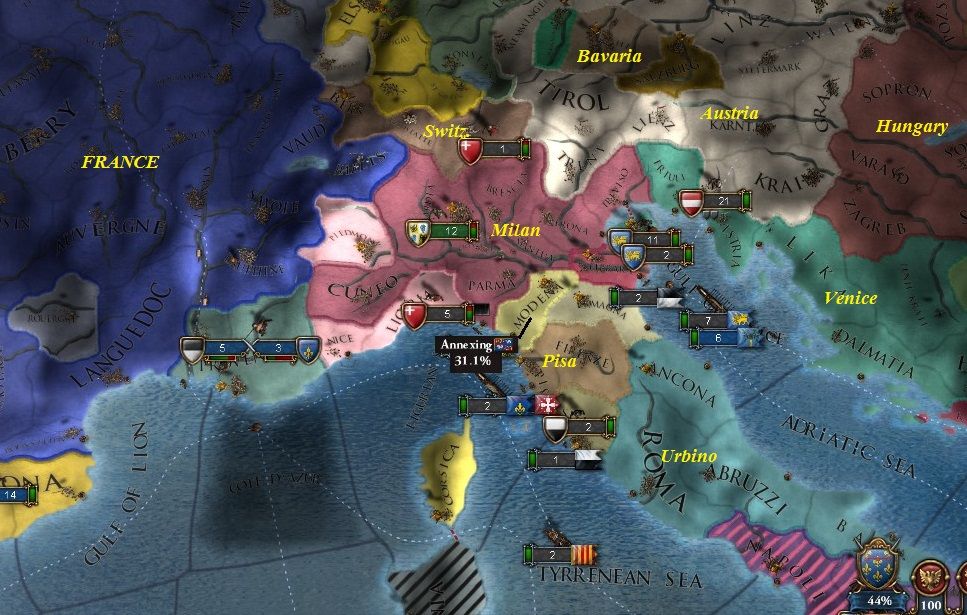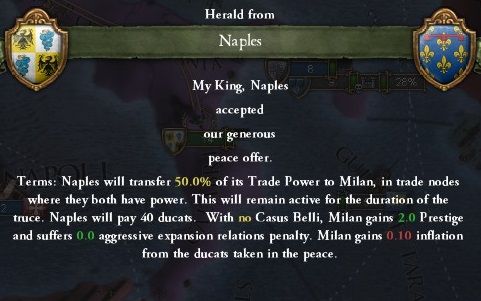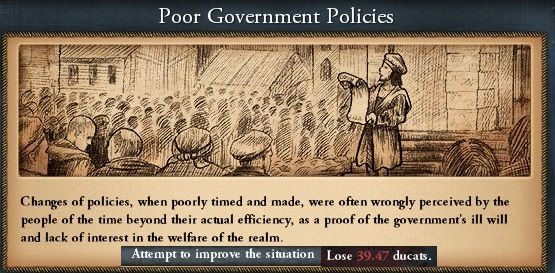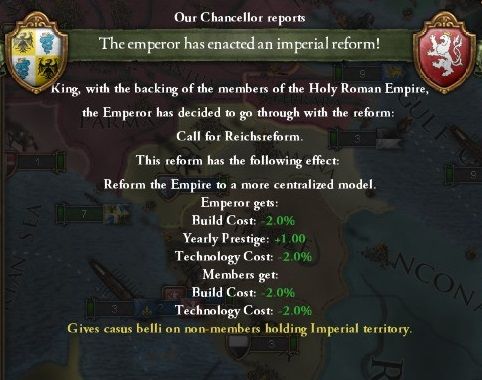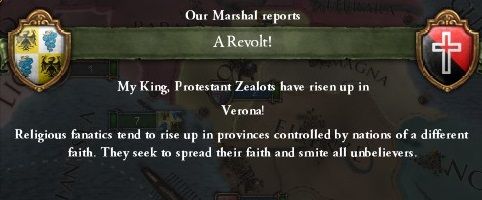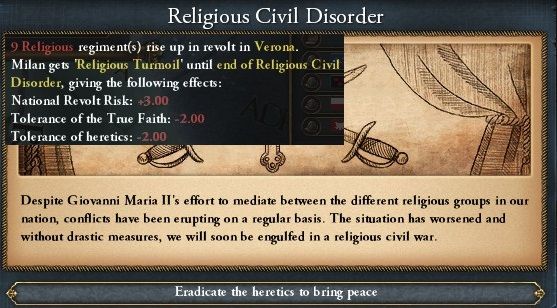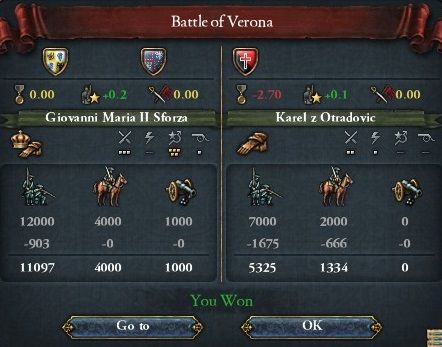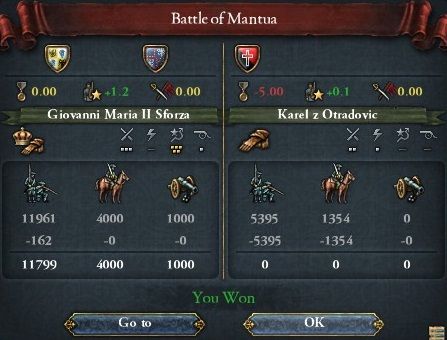Chapter XXXV - The Emperor Converts
@GreatUberGeek: I got a good laugh at seeing an Orthodox Venice! And we are on a path towards Italian domination, only power in Italy that really rivals us now is Urbino. Treviso was a really great victory, probably due to me being a bit ahead in military tech more than anything else.
@Derahan: I'm wondering if Venice may lean Orthodox sometimes due to the lands it usually acquires in the Balkans. It'd make sense that they convert if the bulk of their population is Orthodox.
A few months would pass by with little of consequence happening in Milan. Until December of 1507, when word from the Sforza’s that ruled France would enter the Ducal Court. Giovanni sat in council alongside his son Sforza Maria Sforza who was for the first time in attendance at council, along with Vittorio Bargnani, and the usual councilors. The mood was rather high at the beginning of this session, for Milan had conquered Treviso, and had survived the Sweat. Tensions with the peasants had died down temporarily after Archbishop Ippolito d’Este’s purge of suspected heretics. In fact there hadn’t been a public burning in almost two months now.
There were two things, however, that would destroy the victorious mood in that room. Both were items that Vittorio had on the agenda. “Lords,” the statesman began, “it has come to our attention that the Habsburgs are laying claim to our newly acquired lands of Treviso.”
“Why would our dear Archduke of Austria want that bastion of heresy?” Archbishop Ippolito asked, more to himself than to anyone in particular.

Portrait of Cardinal Ippolito d'Este, Archbishop of Milan and Ezstergom, by Bartolomeo Veneto
“Ancestral rights, I’d imagine,” the Captain-General of Milan mused. “Surely they wouldn’t risk war, though, due to our alliance with their one and only friend Castille.”
“They’re not prepared for a war, but even so, it is worrisome,” Vittorio replied. “I’d imagine the Kings of Castille, would side with the Habsburgs if it came down to it. They’re not very happy with our previous expedition against Venice.”
“We’d be left to once again rely solely on the power of the Italian Princes if Austria attacks. I doubt our cousins of Italy would have the stomach to face down the Habsburgs,” Giovanni stated. “We would be well served if we send one of our diplomats to Vienna to begin repairing relations with the Archduke. That way we may save ourselves from destruction through diplomatic mean rather than those of war.”
Vittorio nodded in agreement, for the first time in a while he actually agreed with Giovanni’s ideas, which pleased him immensely. “I will send one of our diplomats immediately.”
Sforza Maria shifted in his seat, “I say we have our Captain-General train more men, another ten thousand and we would be able to match man for man with the Habsburgs. And then let them attack us if they wish, we will show them the might of Italy.”
Giovanni shook his head realizing his son had yet a lot to learn, “Even with ten thousand more men in the Armata di Lombardia we would be hard pressed to defend our lands, Sforza Maria. And should Castille side with their long-time friend Austria we’d be outnumbered two-to-one again. Then, we would get attacked by Venice for they would see their chance to lay claim to Verona. And the deathblow would come from our cousins in France who would see their chance to capture Milan itself. We would be swamped by enemies with nowhere to turn, no friends, no allies of note to save us from destruction. Sometimes war is not the answer. Sometimes we must be patient and send sweet little lies to our foes so that they think we respect them and their power.”
Sforza Maria shook his head, not really understanding his father’s brief lesson, yet embarrassed enough not to open his mouth again. Instead, he sat and watched as the meeting returned to its usual discussions of relations between this prince and that prince, and what to do with the Protestants. All Sforza really wanted was a war to prove himself in. And thus he sat quietly, waiting.
“Which brings us once again to another issue in regards to your cousins in France, my lords,” Vittorio began again. “The King of France is even unhappier with our conquest of Treviso than are the Habsburgs.”
“What do you mean?” Giovanni asked slightly worried.
Vittorio pulled the parchment out and looked at for a brief moment and coughed before he began to highlight the main points of the lengthy French complaint. The French wrote that a subject such as Milan should not declare wars without their sovereign’s approval, and continued onwards listing the reasons why Milan was rightfully a possession and vassal of France and therefore unable to declare war on its own accord. In closing, the French King levied a warning against his “beloved” Giovanni, stating that he would hate to have to invade beautiful Lombardi just to put down a disobedient dog.
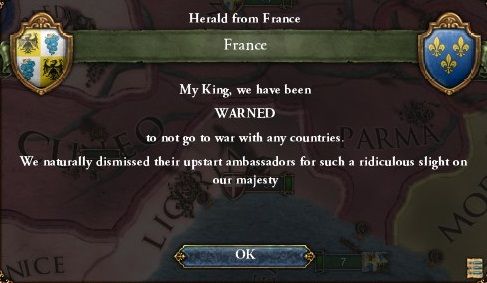
“What was father thinking when he hatched the plot to install a Sforza on the French Throne?” Giovanni moaned. “It’s created a catastrophe that I have to deal with every-time I wake.”
“Perhaps we should claim France for ourselves then, father,” Sforza Maria spoke up at last, knowing this would be laughed at and ridiculed but it was an idea that had to be spoken. “By rights we could take his crown as our own and rule France from Milan.”
Giovanni shook his head, and Vittorio just looked down at the table unsure of what to say to the heir to Milan. “Son, the French would never accept our rule. They barely accept his rule. They only deal with it because he is a descendant of the former ruling house, and the nobility stays too busy with the minor wars he plans and occupies their time with.”
“So we placate the French as well?” Sforza Maria asked. “Before long all Milan will be known for is bending our knees to the powerful. When will we stand up to them and let them know they cannot dictate terms to us?”
“When we are ready, son,” Giovanni answered exasperated. “For now we bow, and placate our enemies. And one day perhaps when you are Duke you can stand-up and fight the apocalyptic war you so desire.”
The council meeting drew to a close then, with the lords of Milan leaving the room feeling slightly more pessimistic about the future of their beloved duchy than they had upon the commencement of the meeting. Dark clouds loomed overhead, and the future would revolve around diplomatic niceties rather than Milanese arms. The wrong step by a diplomat in Vienne or Paris, could spell the destruction of Milan. Thus, the money Giovanni had gained from the war with Venice and placed into constructing new star forts throughout Lombardia was a godsend, as it would make everyone in Milan feel a bit safer should the great powers of Europe come calling.
1508 would begin with the dark clouds of threats looming on the horizon. There was no assurance from the Habsburgs or Sforza’s of France that war would not be waged. The Armata di Lombardia sat on constant alert ready to march East or West dependent upon which power declared war first. The populace would begin to grow weary of the imminent threat as new taxes were levied to support the army. Rumors of heresy once again began to sprout, if true no one knew where their secret meetings were held or who was sponsoring the Protestants. This time not even Ippolito d’Este could find the source to pull the weed from the ground.
The University of Parma, however, continued with their studies to further the power of Milanese arms. This time they announced improvements to the ships and encouraged Duke Giovanni to spend lavishly upon ensuring the fleet was equipped with the new ideas. And by August of that year the star fort outside of Milan was completed.
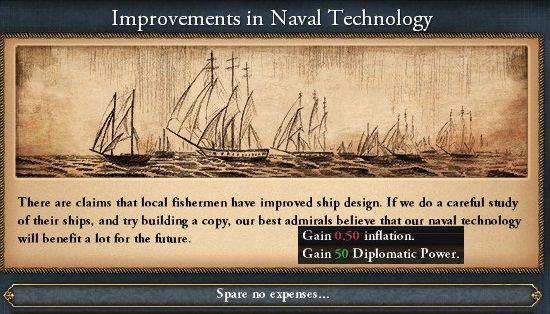
One day in November Giovanni and Sforza Maria were out inspecting the new fortifications, when Archbishop Ippolito d’Este would ride up to them.
“Lords,” the Archbishop greeted looking dour, “News from the Imperial Court.”
“What tidings, your eminence?” Giovanni asked as he looked up at the daunting fortifications.
“Emperor Vladimir, King of Bohemia, has forsaken the true religion and has taken communion with the Protestants!” Ippolito exclaimed. “The Prince of Luneburg also has sworn to follow the Emperor’s path of heresy.”
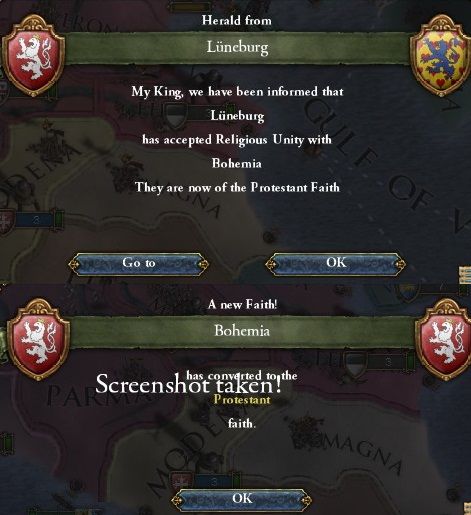
Father and son exchanged looks of apprehension. The Emperor of the Holy Roman Empire forsaking the Catholic beliefs and becoming a heretic was worrisome. But, it could be an opportunity as well.
“Perhaps this is what we need to bring Austria and even France back to our side,” Giovanni said as he continued to inspect the star fort.
“Form a Catholic League to destroy the upstart religion?” Sforza Maria said quietly to his father. “Use it to depose Vladimir and install the Habsburgs upon the throne, they would owe everything to us then.”
Giovanni shook his head, “No, instead we shall begin negotiations on forming a Catholic League, headed by us, to do our bidding. Your eminence, go to Bologna and inform the Pope of our unwavering loyalty to the Holy Church, and whisper in the ears of your fellow Cardinals about our desires.”
“Yes, your grace,” Ippolito answered as he turned his horse around and rode off. This turn of events would commence an era of turbulence within the Empire that would see religious wars erupt between former friends and family members, as two opposing creeds began to vie for supremacy.
@GreatUberGeek: I got a good laugh at seeing an Orthodox Venice! And we are on a path towards Italian domination, only power in Italy that really rivals us now is Urbino. Treviso was a really great victory, probably due to me being a bit ahead in military tech more than anything else.
@Derahan: I'm wondering if Venice may lean Orthodox sometimes due to the lands it usually acquires in the Balkans. It'd make sense that they convert if the bulk of their population is Orthodox.
~~~~~
Chapter XXXV - The Emperor Converts
Chapter XXXV - The Emperor Converts
A few months would pass by with little of consequence happening in Milan. Until December of 1507, when word from the Sforza’s that ruled France would enter the Ducal Court. Giovanni sat in council alongside his son Sforza Maria Sforza who was for the first time in attendance at council, along with Vittorio Bargnani, and the usual councilors. The mood was rather high at the beginning of this session, for Milan had conquered Treviso, and had survived the Sweat. Tensions with the peasants had died down temporarily after Archbishop Ippolito d’Este’s purge of suspected heretics. In fact there hadn’t been a public burning in almost two months now.
There were two things, however, that would destroy the victorious mood in that room. Both were items that Vittorio had on the agenda. “Lords,” the statesman began, “it has come to our attention that the Habsburgs are laying claim to our newly acquired lands of Treviso.”
“Why would our dear Archduke of Austria want that bastion of heresy?” Archbishop Ippolito asked, more to himself than to anyone in particular.

Portrait of Cardinal Ippolito d'Este, Archbishop of Milan and Ezstergom, by Bartolomeo Veneto
“Ancestral rights, I’d imagine,” the Captain-General of Milan mused. “Surely they wouldn’t risk war, though, due to our alliance with their one and only friend Castille.”
“They’re not prepared for a war, but even so, it is worrisome,” Vittorio replied. “I’d imagine the Kings of Castille, would side with the Habsburgs if it came down to it. They’re not very happy with our previous expedition against Venice.”
“We’d be left to once again rely solely on the power of the Italian Princes if Austria attacks. I doubt our cousins of Italy would have the stomach to face down the Habsburgs,” Giovanni stated. “We would be well served if we send one of our diplomats to Vienna to begin repairing relations with the Archduke. That way we may save ourselves from destruction through diplomatic mean rather than those of war.”
Vittorio nodded in agreement, for the first time in a while he actually agreed with Giovanni’s ideas, which pleased him immensely. “I will send one of our diplomats immediately.”
Sforza Maria shifted in his seat, “I say we have our Captain-General train more men, another ten thousand and we would be able to match man for man with the Habsburgs. And then let them attack us if they wish, we will show them the might of Italy.”
Giovanni shook his head realizing his son had yet a lot to learn, “Even with ten thousand more men in the Armata di Lombardia we would be hard pressed to defend our lands, Sforza Maria. And should Castille side with their long-time friend Austria we’d be outnumbered two-to-one again. Then, we would get attacked by Venice for they would see their chance to lay claim to Verona. And the deathblow would come from our cousins in France who would see their chance to capture Milan itself. We would be swamped by enemies with nowhere to turn, no friends, no allies of note to save us from destruction. Sometimes war is not the answer. Sometimes we must be patient and send sweet little lies to our foes so that they think we respect them and their power.”
Sforza Maria shook his head, not really understanding his father’s brief lesson, yet embarrassed enough not to open his mouth again. Instead, he sat and watched as the meeting returned to its usual discussions of relations between this prince and that prince, and what to do with the Protestants. All Sforza really wanted was a war to prove himself in. And thus he sat quietly, waiting.
“Which brings us once again to another issue in regards to your cousins in France, my lords,” Vittorio began again. “The King of France is even unhappier with our conquest of Treviso than are the Habsburgs.”
“What do you mean?” Giovanni asked slightly worried.
Vittorio pulled the parchment out and looked at for a brief moment and coughed before he began to highlight the main points of the lengthy French complaint. The French wrote that a subject such as Milan should not declare wars without their sovereign’s approval, and continued onwards listing the reasons why Milan was rightfully a possession and vassal of France and therefore unable to declare war on its own accord. In closing, the French King levied a warning against his “beloved” Giovanni, stating that he would hate to have to invade beautiful Lombardi just to put down a disobedient dog.

“What was father thinking when he hatched the plot to install a Sforza on the French Throne?” Giovanni moaned. “It’s created a catastrophe that I have to deal with every-time I wake.”
“Perhaps we should claim France for ourselves then, father,” Sforza Maria spoke up at last, knowing this would be laughed at and ridiculed but it was an idea that had to be spoken. “By rights we could take his crown as our own and rule France from Milan.”
Giovanni shook his head, and Vittorio just looked down at the table unsure of what to say to the heir to Milan. “Son, the French would never accept our rule. They barely accept his rule. They only deal with it because he is a descendant of the former ruling house, and the nobility stays too busy with the minor wars he plans and occupies their time with.”
“So we placate the French as well?” Sforza Maria asked. “Before long all Milan will be known for is bending our knees to the powerful. When will we stand up to them and let them know they cannot dictate terms to us?”
“When we are ready, son,” Giovanni answered exasperated. “For now we bow, and placate our enemies. And one day perhaps when you are Duke you can stand-up and fight the apocalyptic war you so desire.”
The council meeting drew to a close then, with the lords of Milan leaving the room feeling slightly more pessimistic about the future of their beloved duchy than they had upon the commencement of the meeting. Dark clouds loomed overhead, and the future would revolve around diplomatic niceties rather than Milanese arms. The wrong step by a diplomat in Vienne or Paris, could spell the destruction of Milan. Thus, the money Giovanni had gained from the war with Venice and placed into constructing new star forts throughout Lombardia was a godsend, as it would make everyone in Milan feel a bit safer should the great powers of Europe come calling.
1508 would begin with the dark clouds of threats looming on the horizon. There was no assurance from the Habsburgs or Sforza’s of France that war would not be waged. The Armata di Lombardia sat on constant alert ready to march East or West dependent upon which power declared war first. The populace would begin to grow weary of the imminent threat as new taxes were levied to support the army. Rumors of heresy once again began to sprout, if true no one knew where their secret meetings were held or who was sponsoring the Protestants. This time not even Ippolito d’Este could find the source to pull the weed from the ground.
The University of Parma, however, continued with their studies to further the power of Milanese arms. This time they announced improvements to the ships and encouraged Duke Giovanni to spend lavishly upon ensuring the fleet was equipped with the new ideas. And by August of that year the star fort outside of Milan was completed.

One day in November Giovanni and Sforza Maria were out inspecting the new fortifications, when Archbishop Ippolito d’Este would ride up to them.
“Lords,” the Archbishop greeted looking dour, “News from the Imperial Court.”
“What tidings, your eminence?” Giovanni asked as he looked up at the daunting fortifications.
“Emperor Vladimir, King of Bohemia, has forsaken the true religion and has taken communion with the Protestants!” Ippolito exclaimed. “The Prince of Luneburg also has sworn to follow the Emperor’s path of heresy.”

Father and son exchanged looks of apprehension. The Emperor of the Holy Roman Empire forsaking the Catholic beliefs and becoming a heretic was worrisome. But, it could be an opportunity as well.
“Perhaps this is what we need to bring Austria and even France back to our side,” Giovanni said as he continued to inspect the star fort.
“Form a Catholic League to destroy the upstart religion?” Sforza Maria said quietly to his father. “Use it to depose Vladimir and install the Habsburgs upon the throne, they would owe everything to us then.”
Giovanni shook his head, “No, instead we shall begin negotiations on forming a Catholic League, headed by us, to do our bidding. Your eminence, go to Bologna and inform the Pope of our unwavering loyalty to the Holy Church, and whisper in the ears of your fellow Cardinals about our desires.”
“Yes, your grace,” Ippolito answered as he turned his horse around and rode off. This turn of events would commence an era of turbulence within the Empire that would see religious wars erupt between former friends and family members, as two opposing creeds began to vie for supremacy.
~~~~~
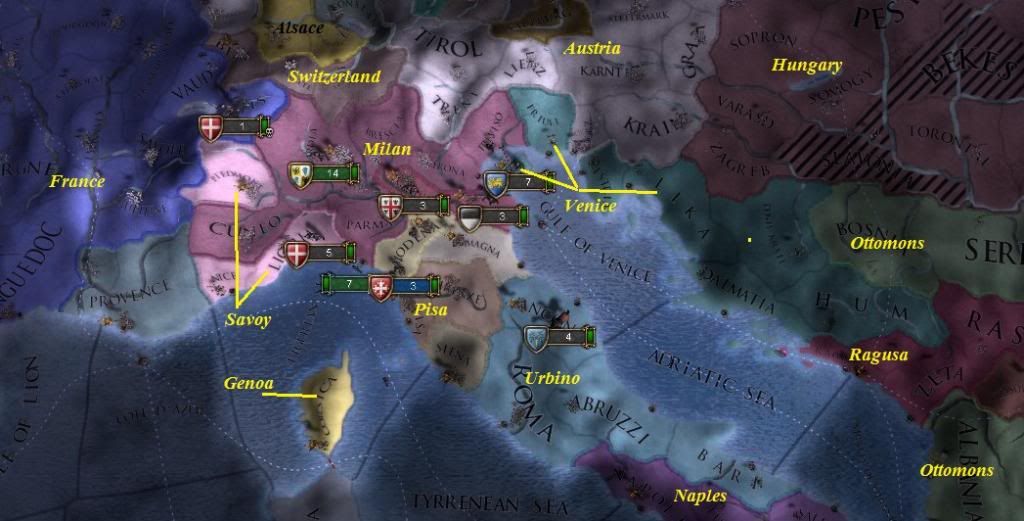

Last edited:


